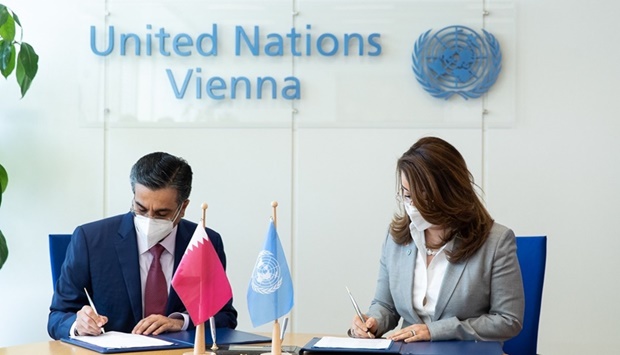Qatar, represented by the National Committee to Combat Human Trafficking (NCCHT), and the United Nations (UN), represented by the United Nations Office on Drugs and Crime (UNODC), have signed a declaration of intent to establish in Doha an international centre for training and research specialised in combating human trafficking.
It will be under the supervision of the UN, Qatar News Agency (QNA) reports.
HE the Minister of Labour Dr Ali bin Smaikh al-Marri, who is also the NCCHT Chairman, signed for the Qatari side, while the UN signatory was Dr Ghada Waly, executive director of the Vienna-based UNODC.
The signing of the declaration of intent to establish the international centre for training and research to combat human trafficking is an extension of the Arab initiative to build national capacities in Arab countries in the field of combating human trafficking, and in line with the prominent role of Qatar in curbing human trafficking crimes since the Doha Forum in 2010, especially after the establishment of the NCCHT in Qatar.
The declaration of intent is the culmination of years of intensive work since the launch of the Arab initiative to combat human trafficking, to become a global centre specialised in preparing studies and research in this field.
After completing the required procedures, the Doha-based centre aims to benefit from the achievements of the Arab initiative to build national capacities in the Arab countries and work to expand the scope of its results.
The centre will work on preparing a database and information that includes legislation related to combating human trafficking, the process of monitoring violations, and submitting and publishing international reports in this field, in a way that contributes to activating the UN mechanisms and standards in various countries.
Qatar has sponsored the Arab initiative to build national capacities in the field of combating human trafficking in Arab countries in co-operation with the UNODC and the Arab League.
It has also supported the UN Global Plan of Action to Combat Trafficking in Persons since its adoption and has taken many legislative measures, including Law No. 15 of 2011 on combating human trafficking, which criminalises trafficking in all its forms and patterns, Law No. 21 of 2015 that abolished the sponsorship system, and Law No. 15 of 2017 on domestic workers.
The National Committee to Combat Human Trafficking, which was established by Cabinet Decision No. 15 of 2017, aims to prepare and publish an annual report on efforts to prevent, monitor and combat human trafficking, develop a national plan to combat human trafficking, prepare a database of relevant international legislation, and raise awareness through the means of human trafficking through holding conferences and seminars, preparing pamphlets, training programmes and others to achieve the objectives of the committee.
It will be under the supervision of the UN, Qatar News Agency (QNA) reports.
HE the Minister of Labour Dr Ali bin Smaikh al-Marri, who is also the NCCHT Chairman, signed for the Qatari side, while the UN signatory was Dr Ghada Waly, executive director of the Vienna-based UNODC.
The signing of the declaration of intent to establish the international centre for training and research to combat human trafficking is an extension of the Arab initiative to build national capacities in Arab countries in the field of combating human trafficking, and in line with the prominent role of Qatar in curbing human trafficking crimes since the Doha Forum in 2010, especially after the establishment of the NCCHT in Qatar.
The declaration of intent is the culmination of years of intensive work since the launch of the Arab initiative to combat human trafficking, to become a global centre specialised in preparing studies and research in this field.
After completing the required procedures, the Doha-based centre aims to benefit from the achievements of the Arab initiative to build national capacities in the Arab countries and work to expand the scope of its results.
The centre will work on preparing a database and information that includes legislation related to combating human trafficking, the process of monitoring violations, and submitting and publishing international reports in this field, in a way that contributes to activating the UN mechanisms and standards in various countries.
Qatar has sponsored the Arab initiative to build national capacities in the field of combating human trafficking in Arab countries in co-operation with the UNODC and the Arab League.
It has also supported the UN Global Plan of Action to Combat Trafficking in Persons since its adoption and has taken many legislative measures, including Law No. 15 of 2011 on combating human trafficking, which criminalises trafficking in all its forms and patterns, Law No. 21 of 2015 that abolished the sponsorship system, and Law No. 15 of 2017 on domestic workers.
The National Committee to Combat Human Trafficking, which was established by Cabinet Decision No. 15 of 2017, aims to prepare and publish an annual report on efforts to prevent, monitor and combat human trafficking, develop a national plan to combat human trafficking, prepare a database of relevant international legislation, and raise awareness through the means of human trafficking through holding conferences and seminars, preparing pamphlets, training programmes and others to achieve the objectives of the committee.

